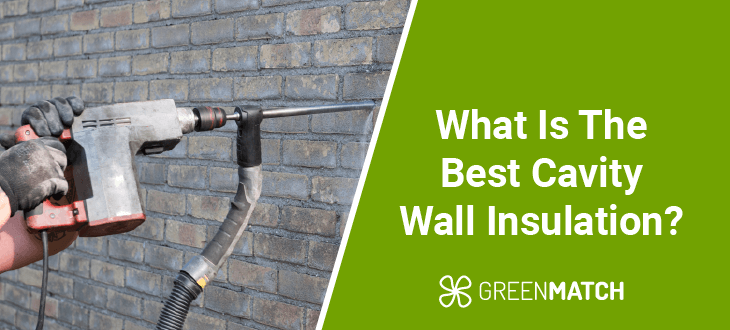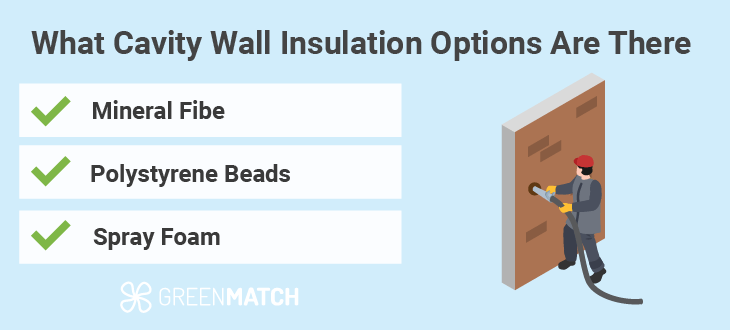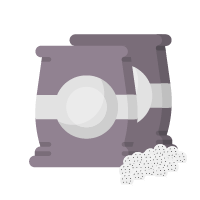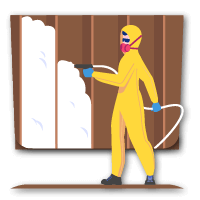Answer these simple questions and we will find you the BEST prices
Which type of solar quotes do you need?
It only takes 30 seconds
100% free with no obligation

Get Free quotes from insulation specialists near you

Save money by comparing quotes and choosing the most competitive offer

The service is 100% free and with no obligation
- GreenMatch
- Insulation
- Wall Insulation
- Cavity Wall Insulation
- Best Cavity Wall Insulation
Best Cavity Wall Insulation: Your 2025 Guide


- Cavity wall insulation in a detached UK home can save up to £405 in annual energy bills.
- Installing cavity wall insulation is a quick, easy, and non-invasive process that lasts up to a century.
- Foam insulation is the most popular cavity wall insulation material, but there are far more environmentally friendly and effective alternatives to consider.
Nearly 75% of all properties in the UK have cavity walls. Yet, 29% of these properties lack adequate cavity wall insulation, according to the UK Department for Energy Security & Net Zero. This leads to soaring energy bills, a drafty unpleasant home environment, and a staggering carbon footprint for homeowners and tenants alike.
Luckily, cavity wall insulation stands as a cost-effective, highly durable, and long-term solution to boost your home's energy efficiency, save you money, and help protect the planet in the long run. It’s a win-win for everybody!
Considering cavity wall insulation is just the first step, what is the best cavity wall insulation material for you? With a wealth of options to choose from, it can be confusing to navigate the insulation market, but that’s where GreenMatch UK can help.
This complete guide will delve into everything you need to get your cavity walls insulated, including the best cavity wall insulation types, average costs, and more.
Ready to get your cavity walls insulated? Let GreenMatch UK be your one-stop solution for all your needs. Instead of spending endless hours on websites and phone calls to land the best bargain, just spend 30 seconds filling out our online form, and we will send you up to 3 free home-tailored quotes from professional installers in your area. No extra charges, no obligations. Just click below to begin!
- Describe your needs
- Get free quotes
- Choose the best offer
It only takes 30 seconds



What is the best cavity wall insulation?
The best cavity wall insulation in terms of popularity and performance may be spray foam insulation, however, this is certainly not the most environmentally friendly or sustainable option. In recent years, alternative materials have been gaining popularity due to their affordability, robustness and eco-friendliness.
In any case, the best cavity wall insulation material will depend on your specific needs, such as budget-friendliness, sustainability, or insulation effectiveness. Insulating your home, no matter what you choose, will almost always benefit you in the long run.
This article will cover all the key options that you have on the market, and what you could expect from each as a result.
Types of cavity wall insulation

There are three key types of cavity wall insulation materials to consider for your property: mineral fibre, polystyrene beads, or spray foam. These different types of cavity wall insulation come with pros and cons, cost ranges and insulation effectiveness to consider.
It’s good to note that regardless of your chosen material, insulating walls will require a professional installer to insulate your cavity walls. This is because the process involves complex drilling, and industry-specific equipment that cannot be handled DIY.
Here’s a rundown of the key cavity wall insulation materials that you can consider for the job.
Mineral fibre

Mineral fibre is a cost-effective choice for cavity wall insulation, typically costing between £14 - £20 per square metre. It's also one of the more sustainable options, being produced from recycled materials and recyclable itself.
The installation involves injecting loose fibres through drilled holes using specialist equipment. However, optimal performance is achieved through a proper airtight seal. This is because mineral fibre can be susceptible to moisture damage and can lose its effectiveness if it gets wet.
- Cost-effective: Mineral fibre offers a budget-friendly insulation solution.
- Sustainable: Made from recycled materials and recyclable itself.
- Performance: Requires a professional installation with a tight seal to prevent moisture issues that can reduce effectiveness.
- Moisture sensitivity: Mineral fibre is more prone to moisture problems compared to other cavity wall insulation materials. This can lead to clumping and, in severe cases, necessitate removal and replacement, which is an expensive process.
Polystyrene beads

Polystyrene bead insulation, also known as EPS bead insulation, offers a compelling option for homeowners seeking a sustainable, high-performance, and long-lasting solution that costs around £18 - £22 per square metre.
Polystyrene beads are small beads around 0.5mm in diameter that can expand up to 3 - 5cm after injection to fill up the cavity space. While this is not a natural product, the endless recyclability and excellent insulation properties of polystyrene beads make it a worthy contender to consider.
- Eco-friendly and durable: EPS beads are highly recyclable. Once removed, they can be broken down and transformed into new products. Additionally, their excellent water resistance prevents moisture build-up, promoting long-term insulation performance.
- Superior insulation: EPS beads boast impressive thermal properties, trapping heat within your home much like rigid PUR boards and significantly better than standard mineral wool insulation. This translates to reduced energy bills and improved comfort.
- Moisture resistant: Unlike some insulation materials, EPS beads repel water, preventing moisture from penetrating the beads and allowing the insulation to dry quickly even in damp conditions.
- Cost: EPS polystyrene beads are still more expensive than mineral fibre, but in turn are more effective insulators as well.
Cavity foam insulation

Spray foam insulation offers some of the best thermal performance for cavity walls. It fills gaps and expands to create a near-airtight seal, significantly reducing heat loss and lowering your energy bills. Spray foam boasts great mould resistance compared to other insulation materials.
However, its high performance comes with some drawbacks. Cost-wise, you could pay between £22 - £26 per square metre. Spray foam is also typically made from polyurethane (PUR) or polyisocyanurate (PIR), a notoriously unsustainable and unrecyclable material. Installation can also release harmful volatile organic compounds (VOCs) with potential health risks.
- Excellent heat retention: Reduces heat loss and potentially lowers energy bills.
- Superior mould resistance: Provides long-lasting protection against mould growth.
- Air barrier creation: Expands to create a near-airtight seal, minimizing air leaks.
- Environmental impact: Not sustainable or recyclable, with potential VOC emissions during installation.
- Shrinkage: Can shrink over time, reducing insulation effectiveness and potentially allowing water damage.
- Ventilation concerns: The tight seal might hinder air circulation within the cavity, leading to dampness.
Best cavity wall insulation for an older house
For older homes with cavity walls, polystyrene beads would likely be the best type of cavity wall insulation. This is because they exhibit superb insulation capacity, and are mould / moisture-resistant, but for just a fraction of the environmental impact of spray foam!
This is a wise choice, especially because older homes are more prone to moisture and condensation issues than new builds. If not properly sealed, mineral fibre falls under risk of moisture damage, whilst spray foam might hinder air circulation, leading to more moisture.
Best cavity wall insulation for newly built homes
The best cavity wall insulation for newly built homes would likely be mineral fibre or mineral wool. This is because newly built cavity walls are likely undamaged and properly airtight, reducing the risk of moisture buildup in your mineral fibres.
Mineral fibre insulation is also noticeably cheaper than the latter two options, but just as effective in retaining heat. This way, you can save money on your insulation material overall.
Best cavity wall insulation to avoid dampness
To avoid dampness, the reigning champion of insulation materials is once more polystyrene beads. Their moisture and mould resistance ensures that your insulation material isn’t damaged by moisture exposure over time.
While spray foam exhibits similar anti-moisture properties, its lack of air circulation can sometimes lead to moisture buildup regardless, not to mention that spray foam has a detrimental impact on the environment.
What is the best cavity wall insulation for you?
With a clear rundown of the insulation material options on the market for cavity wall insulation, you can consider what option is best for you based on your circumstances and needs. This can be budget-friendliness, insulation effectiveness, or environmental impact related.
If the price of a job seems steep, the UK government luckily has cavity wall insulation grants in place to help low-income and fuel-poor houses with insulation upgrades. Consider checking out the qualification criteria and application process!
It’s also good to keep in mind that working with a professional installer is required, as this job cannot be handled as a DIY project. The process may just be several hours long but requires complex drilling and the use of industry-specific equipment that only installers have.
However, finding a professional and affordable installer can sometimes feel like finding a needle in a haystack. With the endless options on the market, prospective customers are sometimes stuck in an endless loop of researching and vetting with no end in sight. That’s where GreenMatch UK comes in!
Through our services and a nationwide network of accredited installers, you can receive up to 3 free home-tailored quotes by just spending 30 seconds filling out our online form. The best part? Our services come with zero costs, or obligations to follow. Simply click below to begin, and let the bargains come to you!
- Describe your needs
- Get free quotes
- Choose the best offer
It only takes 30 seconds



FAQ
The three cavity wall insulation types are mineral fibre, polystyrene beads, and cavity foam insulation. Each has its pros and cons, insulation effectiveness, and price ranges to consider.
The best type of insulation for a cavity wall is likely polystyrene beads. They are highly effective at retaining heat, moisture and mould resistant, and far less environmentally detrimental than spray foam insulation.
The best cavity wall insulation to avoid dampness is likely polystyrene beads. They are superb at repelling moisture and mould growth, but unlike spray foam, do not run as large a risk of blocking air circulation in your cavity space, leading to moisture buildup.
The most sustainable cavity wall insulation is mineral fibre insulation. Mineral fibre is made almost entirely from recycled materials and is recyclable itself, giving it one of the smallest environmental impacts from production to application. However, it’s important to make sure you work with a sustainable supplier.
For an old house, the best cavity wall insulation would be polystyrene beads. This is because older cavity walls are more likely to damage and lack air-sealed tightness. These types of walls are more prone to moisture buildup, which can damage your mineral fibre insulation. Polystyrene beads on the other hand are highly moisture and mould-resistant.

Akif is a copywriter at GreenMatch since 2023. With a keen interest in community sustainability, green solutions and the role of digital media in identifying climate trends, he aims to hone in on his background in International Studies and Digital Media to provide a multidisciplinary approach to written content rooted in credible research and accuracy.
We strive to connect our customers with the right product and supplier. Would you like to be part of GreenMatch?

- Best Cavity Wall Insulation: Your 2025 Guide
- What is the best cavity wall insulation?
- Types of cavity wall insulation
- Best cavity wall insulation for an older house
- Best cavity wall insulation for newly built homes
- Best cavity wall insulation to avoid dampness
- What is the best cavity wall insulation for you?
- FAQ
